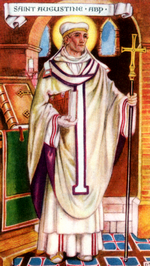Lives of the Saints
Our Models and Protectors
Spiritual Bouquet:
May 28

Saint Augustine
of Canterbury
Apostle of England
(† 605)
Saint Augustine was prior of the monastery of Saint Andrew on Mount Coelius in Rome, when he was appointed by Saint Gregory the Great as Superior of the forty missionaries he was sending to England. The Christian faith of England, more than that of any other nation of Europe, was the fruit of the labors and spiritual conquests of the ministry of monks. Its deepest Christian roots are more ancient than Saint Augustine and his companions, and date from the era of the Apostles. England, in the first century, furnished its contingent of martyrs during the persecution of Diocletian. England sent its bishops to the first Councils held after the religion of Christ became that of the Empire in 313. But in the time of Saint Augustine, the Anglo-Saxon conquest had cut down almost all the branches of the tree.
When Saint Augustine arrived, ruined churches, scarcely a Christian to be found to narrate a tradition, attested to the sacrilegious and incendiary hand of paganism, despite the labors of Saint Palladius and Saint Germain d'Auxerre in the fifth century. The last Christian Britons had taken refuge in the mountains of Wales. And England, the land of the Angles, had become a land of infamous slave-traders for the continent, including Rome; its merchants did not spare their own people when profit was at stake. In this way did Saint Gregory the Great come to purchase the English boys he saw marketed at the Roman Forum, and raise them in his house, which he had transformed into a monastery. Thus the definitive conversion of England began, in his compassionate heart, when in the sixth year of his pontificate he chose the prior of his own monastery for the mission to England.
Saint Augustine and his companions during their journey heard many reports of the barbarism and ferocity of the pagan English. They were alarmed and wished to turn back. But Saint Gregory sent word to them saying, Go on, in God's name! The greater your hardships, the greater your crown. May the grace of Almighty God protect you, and permit me to see the fruit of your labor in the heavenly country! If I cannot share your toil, I shall yet share the harvest, for God knows that it is not good-will which is wanting. The band of missionaries went on in obedience, after halting briefly to deliver letters of Saint Gregory at the Abbey of Lerins, and to the bishops of Aix, Tours, Marseille, Vienna, Autun, and Arles, as well as to obtain translators for the mission of the monks.
Landing at Ebbsfleet, they sent ahead of them their translator-emissaries, to say to the king of those lands that they had come from Rome, to announce to him not merely good news, but the Good News of all ages, with its promises of heavenly joy and an eternal reign in the company of the living and true God. They met with the Saxon King Ethelbert who had been reigning for thirty-six years, and with his barons under a great oak tree at Minster in the present county of Kent, and announced to him the Gospel of Jesus Christ. He was predisposed to listen to the missionaries; his Christian wife, Bertha, was a great-granddaughter of Saint Clothilda and Clovis. He wished to deliberate for a few days nonetheless, and when they returned in procession, chanting and preceded by the Cross, he promised only to give them liberty to practice their faith unmolested. He gave them a residence in Canterbury and provided for their needs. Their good example brought many to them for instruction and then Baptism, and at Pentecost 597, the Anglo-Saxon king, too, entered into the unity of the Church of Christ. His example was followed by the greater number of his nobles and people.
By degrees the Faith spread far and wide, and Augustine, as papal legate, set out on a visitation of Britain. He failed in his attempt to enlist the Christian Britons of the west in the work of his apostolate, but his success was otherwise triumphant from south to north. He died after eight years of evangelical labors, but his monks continued them and perpetuated them. The Anglo-Saxon Church which Saint Augustine founded is still famous for its learning, zeal, and devotion to the Holy See, while its calendar commemorates no fewer than 300 Saints, half of whom were of royal birth.
Reflection. The work of an apostle is the work of the right hand of God. He often chooses weak instruments for His mightiest purposes. The most sure augury of lasting success in missionary labor is obedience to superiors and mistrust of self.
Les Petits Bollandistes: Vies des Saints, by Msgr. Paul Guérin (Bloud et Barral: Paris, 1882), Vol. 6